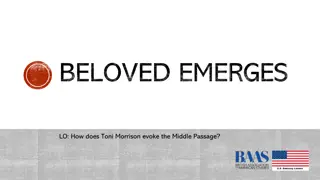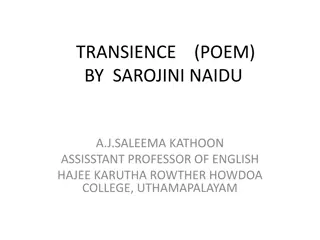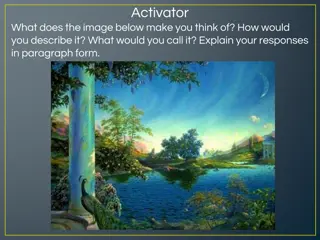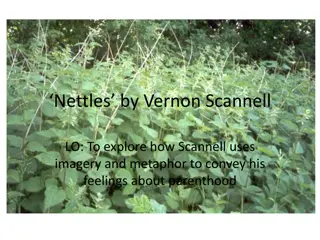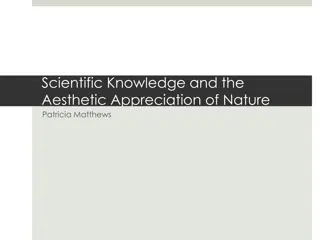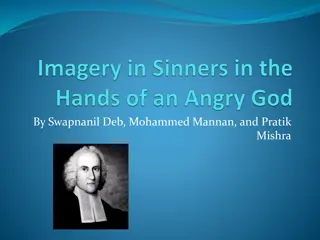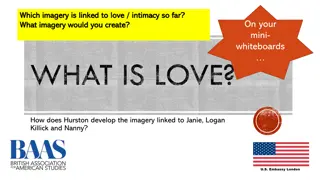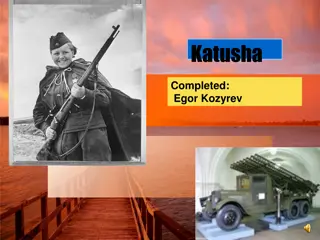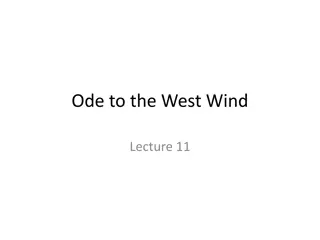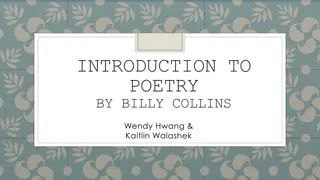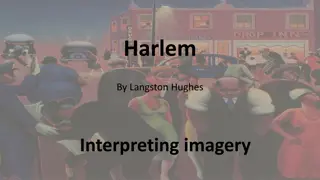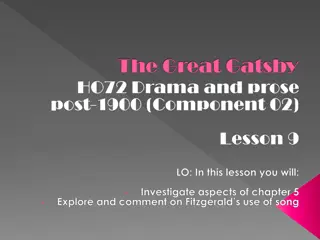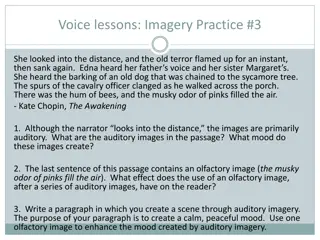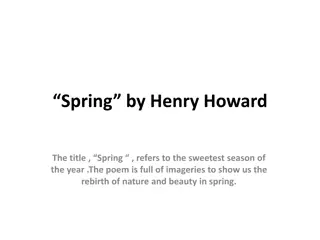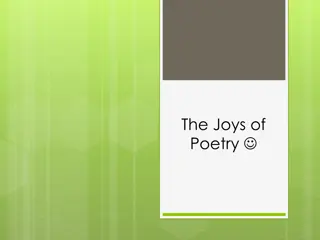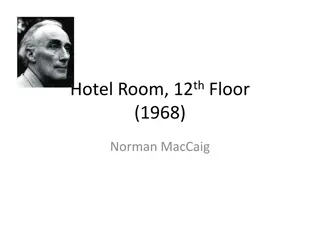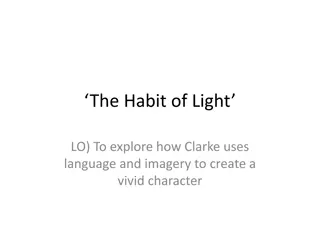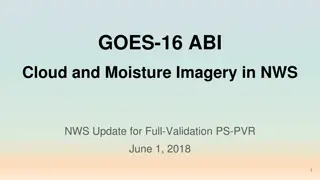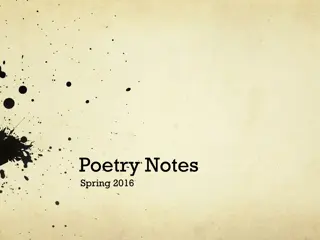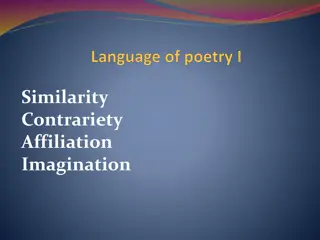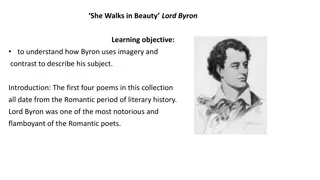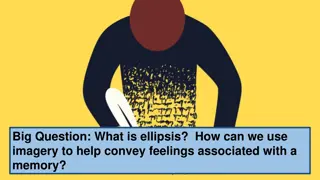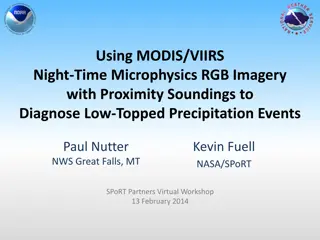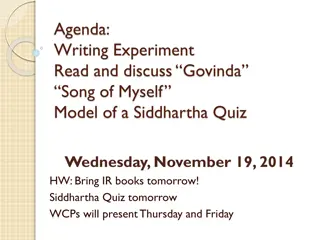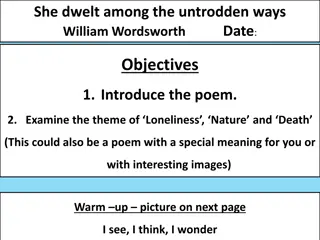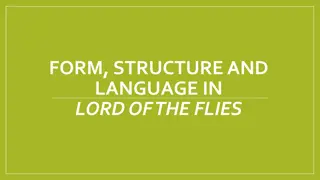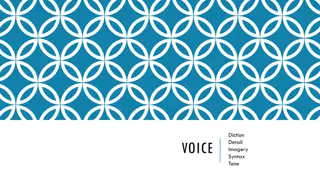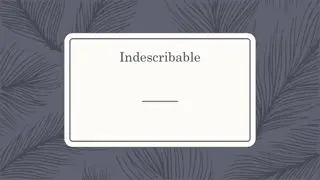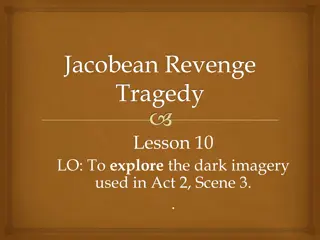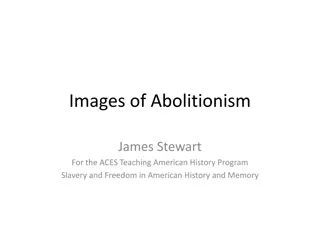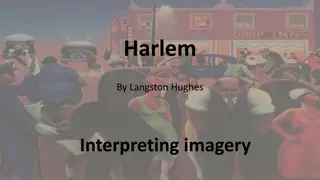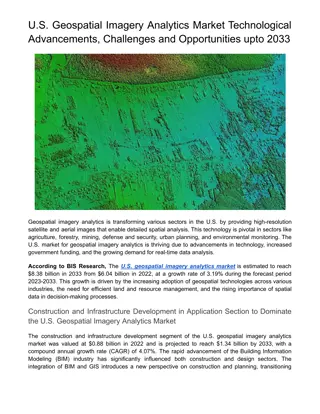Kamil pyciak
Kamil Pyciak, based in the USA, is a passionate nature enthusiast connecting globally on a Polish website. Embracing the diverse landscapes of America, he explores national parks and captures the essence of the great outdoors. Despite the physical distance, Kamil's virtual presence transcends border
1 views • 20 slides
Examining Water Imagery in Toni Morrison's "Beloved" and Its Contextualization with Historical Events
Toni Morrison skillfully evokes the harrowing Middle Passage experience in "Beloved" through water imagery, symbolizing themes of cleansing, rebirth, and trauma. By comparing the water symbolism at various points in the novel, readers can explore its significance in relation to historical events lik
6 views • 14 slides
Transience Poem by Sarojini Naidu - Reflections on Life's Impermanence
In "Transience," Sarojini Naidu conveys a message of optimism amidst life's sorrows. Through vivid imagery, she emphasizes the impermanence of pain and the certainty of new joys and hopes. The poem reflects on the cyclical nature of life, where sorrow gives way to renewal and growth, drawing paralle
0 views • 12 slides
Nature as a Monster in Canadian Literature
Margaret Atwood, a renowned Canadian author, explores the theme of nature as a monster in Canadian literature. The prose delves into the changing perceptions of nature by poets over the centuries, from a kind mother figure to a hostile force. The discussion includes the different types of death port
1 views • 9 slides
Exploring Utopian Ideals through Imagery and Song
The concept of Utopia, an ideally perfect place or society, is explored through various images and songs. The imagery delves into the definition, concepts, religious and scientific connections, varieties, and the song "Imagine" by John Lennon reflects utopian ideals. The Black Eyed Peas' song "Where
0 views • 9 slides
Understanding Figurative Language: A Guide to Metaphors, Similes, and More
Figurative language is a powerful tool used by writers to evoke emotions and create vivid imagery in the minds of readers. It goes beyond literal meanings, allowing for deeper interpretations and connections with the subject matter. This guide explains the difference between figurative and literal l
0 views • 40 slides
Exploring Parenthood Through Imagery in "Nettles" by Vernon Scannell
Vernon Scannell's poem "Nettles" delves into the protective instincts of a father shielding his son from the harsh realities of the world. Through vivid imagery and metaphor, Scannell depicts the struggles of parenthood, portraying nature as a menacing force akin to the military, all while reflectin
0 views • 12 slides
Exploring the Relationship Between Scientific Knowledge and Aesthetic Appreciation of Nature
This discourse delves into the dynamic interplay between scientific understanding and aesthetic appreciation of nature. It discusses varying perspectives on the aesthetic value of nature, the necessity of scientific knowledge in categorizing nature, and criticisms regarding the relevance of informat
0 views • 33 slides
Types of Imagery in Literature
Imagery is a powerful technique used by writers to create vivid mental images for readers. This article explores various types of imagery, including visual, tactile, olfactory, and gustatory imagery, with examples from famous works like "Sinners in the Hands of an Angry God," "A Streetcar Named Desi
0 views • 15 slides
Reflections on Life and Nature: A Study of Longfellow's Poems
Exploring themes of life, nature, and mortality in Henry Wadsworth Longfellow's works "The Tide Rises, The Tide Falls" and "A Psalm of Life." The poems delve into the inevitability of death, the enduring power of nature, and the meaningfulness of life's purpose. Through vivid imagery and poetic devi
0 views • 21 slides
Exploring Imagery and Themes of Love in Hurston's "Their Eyes Were Watching God
This content delves into the imagery and themes of love in Zora Neale Hurston's novel "Their Eyes Were Watching God," focusing on the characters Janie, Logan Killick, and Nanny. It examines the metaphors used by Hurston to develop these characters and their internal worlds. Through analyzing key quo
0 views • 22 slides
Controversial Use of Native American Imagery in Sports Teams
Sports teams like the Washington Redskins, Atlanta Braves, Kansas City Chiefs, Cleveland Indians, and Chicago Blackhawks have faced criticism for their use of Native American imagery and mascots. This has sparked debates on cultural appropriation, racism, and the impact on Native American communitie
2 views • 8 slides
Katyusha - A Poignant Russian Song of Love and Longing
Explore the heartfelt lyrics and melodic tune of 'Katyusha,' a famous Russian song that tells the tale of a young woman's love and devotion to a soldier. The imagery of apple trees, pear trees, and the river sets the scene for Katyusha's melancholic yet beautiful story of longing and hope amidst the
1 views • 12 slides
The Influence of the West Wind on Nature: A Visual Journey
The poetic verses of "Ode to the West Wind" by Percy Bysshe Shelley vividly depict the disruptive and transformative impact of the West Wind on nature. Through captivating imagery, the poem portrays how the West Wind stirs the Mediterranean sea from its slumber, creates chasms in the Atlantic Ocean,
1 views • 20 slides
Exploring Poetry Through Imagery and Tone in Billy Collins' Work
Diving into Billy Collins' poem "Introduction to Poetry," this analysis delves into the use of imagery, figurative language, tone, and style to convey the poet's frustration with how readers often approach poetry superficially. Collins encourages readers to immerse themselves in the emotional depth
0 views • 5 slides
Analyzing Imagery in Langston Hughes' "Harlem" Poem
Langston Hughes' poem "Harlem" explores the consequences of deferred dreams through vivid imagery. The poem contemplates various outcomes of postponed aspirations, evoking themes of frustration, decay, and explosive potential. By dissecting the powerful imagery used in the poem, readers gain insight
0 views • 12 slides
Investigating Fitzgerald's Use of Song and Imagery in Chapter 5 of "The Great Gatsby
Explore the depiction of Daisy and Gatsby, analyze the use of fear-related words, light imagery, and weather in Chapter 5. Delve into Fitzgerald's purpose behind Klipspringer's songs and the reader's understanding of Gatsby's inner life. Reflect on Nick's observation of human change in the final sce
0 views • 5 slides
Literary Analysis: Imagery, Syntax, Diction, and Detail in Voice Lessons
Explore the use of auditory and olfactory imagery in Kate Chopin's "The Awakening," analyze the syntactic structure in Edgar Allan Poe's "The Black Cat," understand the nuances of diction, and delve into Winston Churchill's portrayal of King Henry VIII through contrasting details. Engage with questi
0 views • 22 slides
Analysis of "Spring" by Henry Howard
The poem "Spring" by Henry Howard beautifully captures the essence of the season, showcasing the rebirth of nature and the beauty that comes with it. Through vivid imagery and poetic devices, the poem progresses from the emergence of spring and its delightful transformations to the anticipation of s
0 views • 6 slides
Unveiling the Beauty of Poetry: Elements and Interpretations
Delve into the captivating world of poetry through examining key elements such as form, imagery, stanzas, rhythm, rhyme, mood, and tone. Explore how the title, structure, and language of a poem contribute to its overall meaning and impact. Embrace the vivid imagery, the rhythmic flow, and the emotio
1 views • 10 slides
Hotel Room, 12th Floor: A Poetic Reflection on Urban Chaos by Norman MacCaig
The poem "Hotel Room, 12th Floor" by Norman MacCaig captures the contrast between the serene view from a high-rise hotel room and the chaotic urban life unfolding below. Through vivid imagery, MacCaig contemplates the complexities of civilization, the relentless buzz of city life, and the ever-prese
0 views • 42 slides
The Habit of Light - An Exploration of Language and Imagery by Gillian Clarke
Gillian Clarke's poem "The Habit of Light" beautifully captures the essence of a woman's domestic routine as a sacred ritual. Through vivid language and imagery, Clarke brings to life the character's love for her home and surroundings, celebrating memories of light-filled moments and cherished detai
0 views • 15 slides
GOES-16 ABI Cloud and Moisture Imagery Updates in NWS
Visualize the evolution of GOES-16 ABI imagery processing in NWS, including cloud and moisture imagery updates, AWIPS-2 visualization enhancements, and exploitation tools for mesoscale data. Collaborative efforts have resulted in improved tools for forecasting offices and enhanced meso-utilization p
0 views • 19 slides
Exploring Poetry Elements in Spring 2016 Notes
Poetry, a blend of literary and musical features, encompasses metaphors, similes, imagery, rhyme, meter, and more. This form of art can evoke various emotions and themes through techniques like personification, imagery, alliteration, end rhyme, and internal rhyme. Dive into the beauty of language an
0 views • 18 slides
Understanding Imagery and Figures of Speech
Language conveys meaning through imagery, using comparisons like similes and metaphors. Figures of speech such as parables and allegories help convey deeper ideas through storytelling. Explore the power of symbolism in literature and everyday life.
0 views • 21 slides
Understanding Lord Byron's Use of Imagery in "She Walks in Beauty
Lord Byron, a prominent Romantic poet, utilized vivid imagery and contrast in his poem "She Walks in Beauty" to describe his subject. His life and poetic intentions reflect the Romantic ideals of emotion over reason. The poem, part of the collection "Hebrew Melodies," was meant for musical adaptatio
0 views • 7 slides
Understanding Ellipsis and Using Imagery in Writing
Ellipsis is a punctuation mark indicating omitted words. It can create tension in writing by showing pauses or trailing thoughts. Imagery uses sensory language, personification, similes, and metaphors to paint vivid pictures for readers. Learn how to use these techniques effectively to convey emotio
0 views • 8 slides
Love in September: A Visual Story of Emotions
In a poetic narrative of love and longing, experience the essence of September through heartfelt words and captivating imagery. Dive into the emotions portrayed in each step, accompanied by the imagery of weeping willows, autumn waters, and blue waves rippling. Let the evocative scenes transport you
0 views • 17 slides
Diagnosing Low-Topped Precipitation Events Using Satellite Imagery
Utilizing MODIS/VIIRS Night-Time Microphysics RGB Imagery combined with Proximity Soundings can enhance situational awareness and aid in diagnosing low-topped precipitation events. Various satellite images and data sources are analyzed to understand why heavy rain occurred in Havre, MT, despite mini
0 views • 17 slides
Exploring Imagery Through Writing and Discussion
Delve into the use of imagery in writing through activities like reading, discussing poetry, and connecting themes to literary works. Understand how imagery enhances the reading experience and try creating your own vivid descriptions. Engage in a creative exploration of language and sensory experien
0 views • 26 slides
Analysis of Loneliness, Nature, and Death in "She Dwelt Among the Untrodden Ways" by William Wordsworth
The poem "She Dwelt Among the Untrodden Ways" by William Wordsworth explores the themes of loneliness, nature, and death through the story of a woman named Lucy. The poet vividly describes Lucy's secluded existence, her beauty akin to a hidden violet, and the impact of her death on his own life. Thr
0 views • 24 slides
Collection of Classic Children's Songs Imagery
Enjoy a visual journey through a collection of timeless children's songs brought to life through captivating imagery. From "The Itsy Bitsy Spider" to "Mary Had a Little Lamb," each image evokes the magic of these beloved melodies, inviting both children and adults to relive cherished moments of nost
0 views • 16 slides
Form, Structure, and Language in Lord of the Flies
Explore the language, imagery, and natural imagery used by William Golding in "Lord of the Flies." Discover how Golding incorporates animalistic metaphors to portray the characters and the island environment, enhancing the depth of the narrative through personification and vivid descriptions.
0 views • 10 slides
Mastering Voice in Writing: Diction, Detail, Imagery, Syntax, and Tone
Enhance your writing by mastering the elements of voice - diction, detail, imagery, syntax, and tone. Discover how word choice shapes effective communication and learn the importance of clarity and precision in creating impactful writing.
0 views • 28 slides
Indescribable Majesty: A Poetic Ode to Nature's Wonder
Celebrate the awe-inspiring wonders of nature through poetic verses that pay tribute to the majesty of creation. From the highest heights to the depths of the sea, every aspect of the world around us speaks of the amazing God who crafted it all. The imagery evoked by the verses captures the beauty o
0 views • 25 slides
Exploring Dark Imagery in Jacobean Revenge Tragedy
Delve into the intricate use of dark imagery in Act 2, Scene 3 of a Jacobean revenge tragedy. Analyze a compelling quotation, unraveling layers of meaning, exploring punctuation nuances, and linking it back to the context and critical readings. Engage with classmates to share insights and interpreta
0 views • 7 slides
Exciting Imagery of Abolitionism and Social Change
Explore a collection of powerful images related to abolitionism, including abolitionist approaches to changing public opinion, the composition and appeals of the abolitionist movement, assumptions about race, gender, and class, and the impact of imagery on audiences in different regions. Gain insigh
0 views • 10 slides
Exploring Imagery in Langston Hughes' "Harlem
Explore Langston Hughes' poem "Harlem" written in 1951, which addresses the limitations African Americans face in achieving the American Dream. Delve into the use of imagery to convey a sense of longing and analyze the effects of deferred dreams through vivid descriptions.
0 views • 12 slides
U.S. Geospatial Imagery Analytics Market
The U.S. geospatial imagery analytics market is estimated to reach $8.38 billion in 2033 from $6.04 billion in 2022, at a growth rate of 3.19% during the forecast period 2023-2033.\n\nRead Report Overview: \/\/bisresearch.com\/industry-report\/us-geo
1 views • 3 slides
Understanding Figurative Language: Similes, Metaphors, and Imagery
Explore the world of figurative language through similes, metaphors, and imagery. Discover how similes compare qualities using "like" or "as" with examples like "You are as pretty as a rose." Learn about metaphors that make comparisons without using "like" or "as" such as "The car was a whale." Dive
0 views • 20 slides

